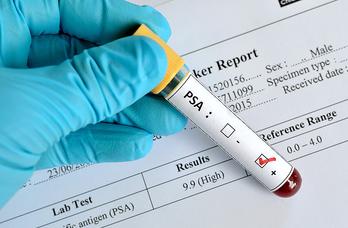
Men’s Health Week (June 14-20) marks the start of our partnership with the Surrey and Sussex Cancer Alliance (SSCA) to raise awareness of prostate cancer. As early prostate cancer often has no symptoms, we want all men to understand the risk categories and to overcome any embarrassment or misconceptions about seeing their GP.
Men who are in risk categories for this disease – those aged over 50, black men and those with a family history of prostate cancer – need to contact their local doctor’s surgery and talk to a health professional about the benefits of having a prostate specific antigen (PSA) test. This is a simple blood test which can help detect prostate cancer.
new patron, actress Felicity Kendal, has filmed a video for social media to encourage women to have conversations with the men in their lives about prostate cancer
“The COVID-19 pandemic has put men off from coming forward to talk about their health,” says Prof Stephen Langley, the Alliance’s urology lead and trustee of The Prostate Project.
Many men are put off the idea as they fear they may have to have a rectal examination. But as early prostate cancer is often undetectable by a physical examination, GP’s now rely on the PSA test. Whilst not perfect, it’s about as accurate as screening mammograms in breast cancer and it is extremely useful in helping to detect early disease.
Early prostate cancer often has no symptoms. Men to be proactive and, if they fall into one of the risk categories, or have any symptoms they are concerned about, such as change to urinary function or blood in urine, to ask their GP about the benefits of having a PSA test.
If caught early prostate cancer is usually curable.
“We know that since the COVID-19 pandemic, men have felt that they shouldn’t be bothering GPs with things like this, but it is important to talk to us if you fall into one of the risk categories for prostate cancer, or if you have any symptoms you are concerned about, such needing to go for a wee more frequently or blood in your urine,” says Dr Alex Norman, Surrey and Sussex Cancer Alliance’s primary care lead and Surrey Downs clinical cancer lead.
“Doctors’ surgeries are open and healthcare professionals can advise well men who don’t have any symptoms about the PSA test so they can make an informed decision about their health. Prostate cancer can be treatable and many men will go on to live long lives after their diagnosis”.
In the UK, prostate cancer is the most common cancer to affect men1 and it is estimated 1 in 8 men will get prostate cancer in their lifetime2. There are three main risk factors2:
- getting older: it mainly affects men aged 50 or over and the most common age for men to be diagnosed with prostate cancer is 65-69 years;
- a family history of prostate cancer: compared to a man with no family history, the risk is 2.5 times greater if a parent or male sibling has been diagnosed;
- black ethnicity – one in four black men will get prostate cancer in their lifetime.
In Surrey and Sussex, prostate cancer is the second most prevalent cancer3 with 97% survival rate at one year from diagnosis4.
References:
- https://www.cancerdata.nhs.uk/incidence/base_numbers
- An export of number of new cancer, national base numbers, in 2018 for males
- https://prostatecanceruk.org/prostate-information/are-you-at-risk/infographic-what-is-my-risk
- https://www.cancerdata.nhs.uk/prevalence
- This observed prevalence counts the number of people that were diagnosed with a cancer between 1995 and 2018 and were still alive on the 31st December 2018.
- https://www.cancerdata.nhs.uk/survival/cancersurvivalengland
- 1 year age standardised survival of male, prostate for Surrey and Sussex cancer alliance, diagnosed between 2014 and 2018
About Surrey and Sussex Cancer Alliance:
Surrey and Sussex Cancer Alliance (SSCA) is one of 21 cancer alliances established across England, and covers a population of just over three million people. It works in partnership with the region’s NHS hospital trusts, clinical commissioning groups, local councils, charities, community and voluntary organisations, patient groups and academic institutes to transform and improve the diagnosis, treatment and care of cancer patients in Surrey and Sussex.
Its aims are to reduce variation and inequalities in the delivery of cancer services across Surrey and Sussex; improve accessibility to cancer services; improve survivorship and outcomes for patients diagnosed with a cancer; create a personalised treatment and recovery plan for patients which reflects their wishes; and share best practice, innovation, and learning across the region. SSCA is based at The Surrey Technology Centre in Guildford.


